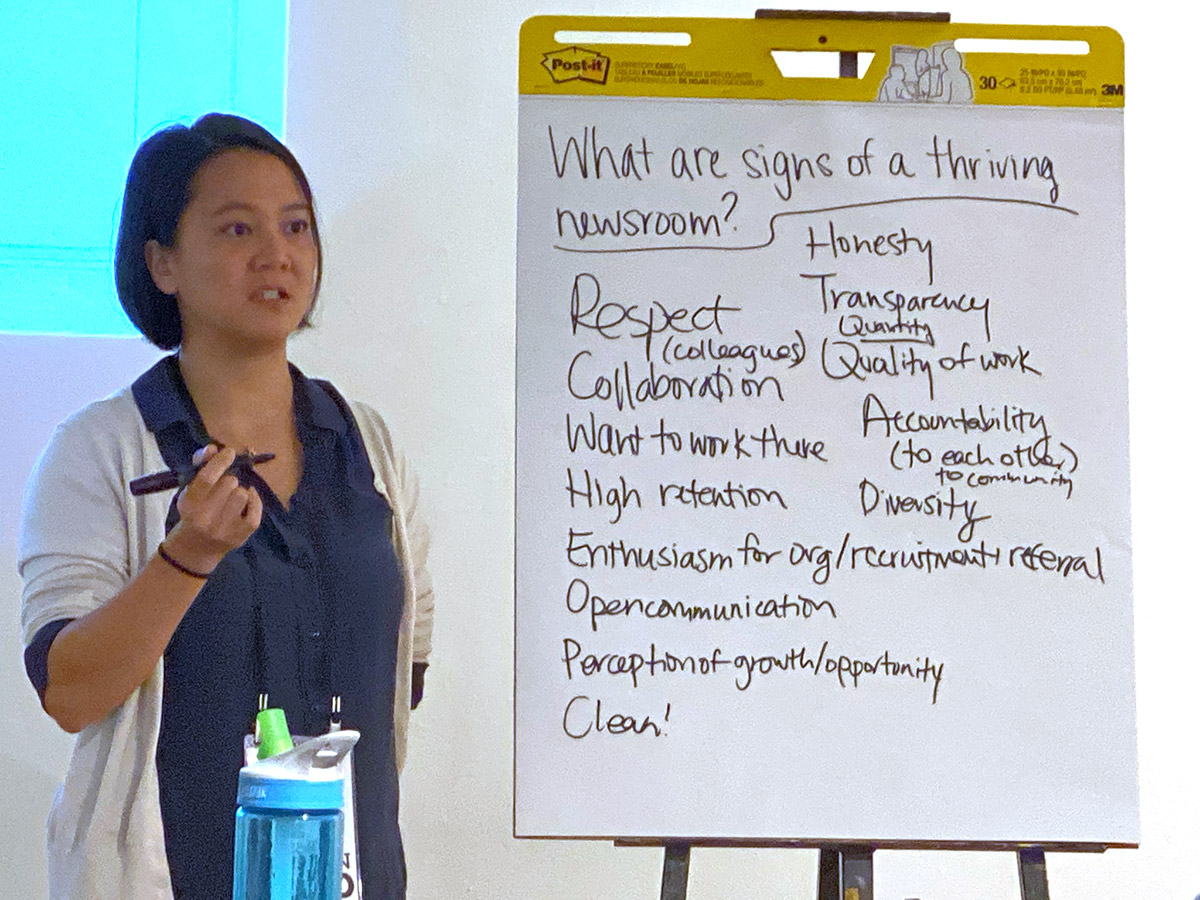Bigger ideas & better skills: What we all took home from SRCCON:LEAD
by Ryan Pitts

SRCCON:LEAD facilitators like Bettina Chang of City Bureau shared tools from newsrooms that are changing the culture of leadership in journalism. (photo/AmyJo Brown)
We’ve been listening to the same voices shape the future of journalism for way too long, so last month in Philadelphia we gathered 120 members of the news-nerd community to challenge how we think about leadership. SRCCON:LEAD was the third in a series of thematic SRCCONs that began in 2017, and together WORK, POWER, and LEAD have helped us imagine what inclusive, equitable newsrooms should look like.
We had a goal for the program in Philly this year: equal parts inspiration and peer education. “Too often we are replicating the structures and habits of the legacy newsrooms where newsroom leadership, including myself, began our careers,” one attendee told us before the conference. So SRCCON:LEAD made room for ideas that shake up the traditional models of newsroom leadership, and time to teach skills that emerging leaders need as they move into new roles. We wanted people to leave ready to push for change and feel like they had the tools to make it happen.
That was a powerful combination for many participants: “It clarified for me how much I want to see leaders who listen, to see leaders who practice—who visibly, transparently demonstrate—a desire to improve.”
There were so many clear takeaways for us, too:
“Manager is a role, managing is a function, leadership is a practice.” Stacy-Marie Ishmael opened the conference with a talk that tore down traditional thinking in journalism and offered a model that came to define the next two days (and made its way into more than a few tweets). Many sessions set management to the side for conversations about collaborative decision-making, resilience, and how power can work with or without a title. “The thing I didn’t expect to find but did was conversations with others who have found ways to push for equity within their organization without being the one who leads it.”
“I didn’t get here on my own and I can’t stay here on my own.” When André Natta reminded us to look to networks of support we can lean on and learn from, we hoped his talk would carry participants into meaningful conversations at small-group dinners that night. Looking back, they were also a perfect reflection of a conference program built on community wisdom, and a glimpse into the future: “The intentional diversity of this crowd really fed my soul and made me excited for the time coming when these folks are leading our news orgs.”
This community is building concrete tools to reshape culture. Many of the sessions at SRCCON:LEAD were organized around resources and approaches that facilitators are already using to transform their own newsrooms. Most news organizations don’t prepare people well as they move into positions of leadership, but as a network of peers, we can teach each other the skills we value and need.
In Philly, participants told us they took home things like:
- Rubrics for hiring and recruiting. Tiff Fehr and C.J. Sinner shared some strategies for reshaping culture in newsrooms of all sizes.
- The ORID framework for focused, collaborative decision-making. Cordelia Yu and Tina Ye offered tools for unpacking the power dynamics in a group and choosing equitable participation.
- A method for clarifying a team’s mission statement. Stephen Stirling and Brian Boyer helped people move from what to why.
- Documents for measuring success and career growth. Bettina Chang and Annie Chabel kickstarted a better process by giving away what’s worked in their own newsrooms: “I am going to straight up copy/paste City Bureau’s evaluation documents to fill out myself.”
- A roadmap for product thinking. Jessica Morrison and Amanda Yarnell shared the approach they used to reorient their newsroom, and tools to help attendees do the same.
One attendee said SRCCON:LEAD “was just what I needed, right when I needed it — chock-full of relevant, practical approaches for addressing so much of the serious mismanagement and lack of focus that’s been plaguing journalism for years now.”
(And even if you weren’t in Philly, you can find all those materials and a whole lot more right here.)
We’re stronger when we work together. Bryan Mercer of Media Mobilizing Project shared a vision of journalism leadership driven by collective action. “Institutions are terrains of struggle,” he said, where the work is hard but open to progress where we push for it. Our newsrooms need change, and it’s not going to come from the leaders who got us here in the first place. It’s going to come from us.
So we need to keep making space to teach each other. We need to listen more and share power, making our newsrooms more inclusive and relevant. And as we do, we need to celebrate even the small victories for what they represent: an immediate sign that change is here, and long-term momentum toward an equitable, responsive future for journalism.
“I came into the conference hoping to learn concrete tasks and skills for being a leader, but what I learned was much bigger: that there’s a choice to be made to align leadership tools/models with values, and I can hold myself and others accountable for which models we choose.”
As we head into 2020, we're thinking a lot about collective action, too. We launched a sustainer program coming out of SRCCON:LEAD, and your donations will help build long-term sustainability for OpenNews while supporting your peers in journalism through the programs we offer. If you find this work meaningful, we invite you to join us!
The latest from the OpenNews team
Looking back at 2023: We spent this year creating opportunity
How we connected at SRCCON 2023, and what we're carrying into next year
Read all our news in our OpenNews blog

